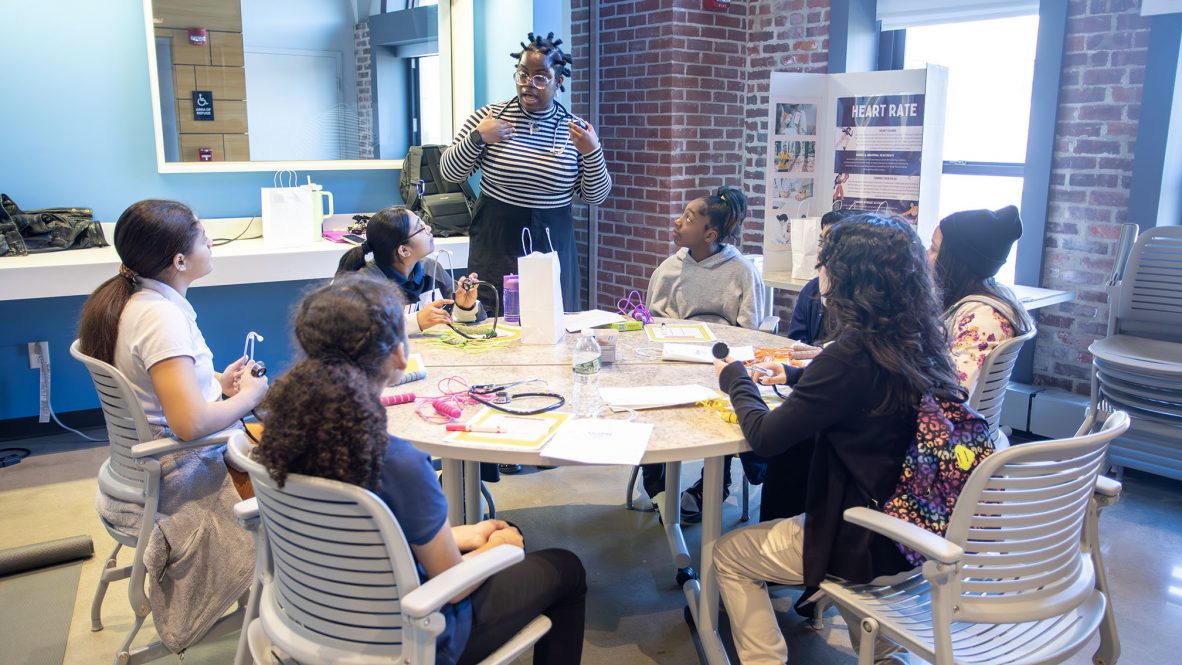The allied health sciences program at UConn Waterbury will begin offering a concentration in public health and health promotion in fall 2025.
“There’s a lot of interest here, and in Storrs too, for careers that aren’t necessarily direct patient care,” says Tamara Kaliszewski, associate professor-in-residence. “So, this offers an option for those students.”
This concentration has been offered to students at UConn Storrs through the Department of Allied Health Sciences, which is part of the College of Agriculture, Health and Natural Resources (CAHNR).
Students in the concentration will take introduction to public health and epidemiology, program planning, biostatistics, and environmental health courses. These courses will be available to all students in the major.
“I think that offering the public health course will benefit students even if they don’t pursue the concentration, because many students don’t come into undergraduate studies understanding what public health is,” Kaliszewski says.
This concentration will help prepare students who want to work in public health after graduation or pursue a masters of public health.
“It does better prepare students for positions in community and public health within the Waterbury region and within the state, as well as help prepare them for graduate study in public health,” says Justin Nash, professor and department head.
UConn Waterbury is well-positioned to offer this concentration thanks to their community connections and faculty expertise.
Recent faculty hires including assistant professors Anna-Michelle McSorley and Pablo Kokay Valente; and assistant professor-in-residence Aviana Rosen contribute to the research and teaching expertise in public health in the Waterbury program.
“There are research opportunities for students who are interested in that aspect of public health, and they bring their expertise to the courses they teach,” Kaliszewski says.
The program has built strong connections with community organizations like the Waterbury Department of Public Health and hospitals in the area.
“Tamara has formed strong relationships and partnerships, which has given our students opportunities for valuable experiential learning,” Nash says. “Having the concentration in public health also fits with that initiative.”
Chelsea Erem ‘24 (CAHNR) took advantage of these opportunities, participating in research and an internship at the Waterbury Department of Public Health.
Erem was inspired to work in the field after taking an infectious diseases course with Valente.
“That was the first time I had really heard of public health,” Erem says. “After taking that course I realized I was interested professionally, particularly the epidemiology side. But I wanted to get a sense of what places public health practitioners work.”
Erem worked closely with the Waterbury director of public health, Aisling McGuckin, to develop a policy proposal for the city’s certificate of occupancy program, a state-wide mandate that health departments inspect tenant housing before people move in.
Erem joined sanitarians on their daily site visits across the city, met with city officials, and attended meetings and town halls.
“I really enjoyed how hands-on it was,” Erem says. “I got to see what public health practice looks like in real time.”
Other students have interned with New Opportunities, an organization focused on addressing food insecurity among older adults, the UConn Health Disparities Institute, the UConn Health Leaders Program, and the Western Connecticut Area Agency of Aging in their Medicare Fraud Office.
During her senior year, Erem also worked with Valente on a research project.
“That’s when I realized I was more interested in the data side, the science side of public health,” Erem says. “It was actually because of him that I ended up applying for a master of public health program.”
Erem is pursuing her master’s at UConn. She plans to build on her undergraduate experience in community-engaged work for her practicum.
“I’m really interested in lifestyle medicine as it relates to research,” Erem says. “And I like community-oriented research where you go out and you give just as much as you take.”
This work relates to CAHNR’s Strategic Vision area focused on Enhancing Health and Well-Being Locally, Nationally, and Globally.
Follow UConn CAHNR on social media



